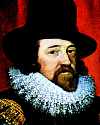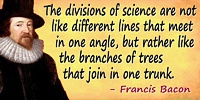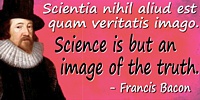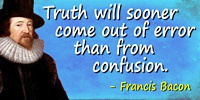 (source)
(source)
|
Sir Francis Bacon
(22 Jan 1561 - 9 Apr 1626)
English philosopher remembered for his influence promoting a scientific method. He held that the aim of scientific investigation is practical application of the understanding of nature to improve man’s condition.
|
Sir Francis Bacon Quotes on Observation (6 quotes)
>> Click for 170 Science Quotes by Sir Francis Bacon
>> Click for Sir Francis Bacon Quotes on | Death | Difference | Discovery | Error | Experiment | Invention | Knowledge | Logic | Man | Mathematics | Mind | Nature | Physician | Science | Study | Thinking | Truth | Understanding | Work |
>> Click for 170 Science Quotes by Sir Francis Bacon
>> Click for Sir Francis Bacon Quotes on | Death | Difference | Discovery | Error | Experiment | Invention | Knowledge | Logic | Man | Mathematics | Mind | Nature | Physician | Science | Study | Thinking | Truth | Understanding | Work |
But by far the greatest hindrance and aberration of the human understanding proceeds from the dullness, incompetency, and deceptions of the senses; in that things which strike the sense outweigh things which do not immediately strike it, though they be more important. Hence it is that speculation commonly ceases where sight ceases; insomuch that of things invisible there is little or no observation.
— Sir Francis Bacon
From Aphorism 50, Novum Organum, Book I (1620). Collected in James Spedding (ed.), The Works of Francis Bacon (1858), Vol. 4, 58.
I would by all means have men beware, lest Æsop’s pretty fable of the fly that sate [sic] on the pole of a chariot at the Olympic races and said, “What a dust do I raise,” be verified in them. For so it is that some small observation, and that disturbed sometimes by the instrument, sometimes by the eye, sometimes by the calculation, and which may be owing to some real change in the heaven, raises new heavens and new spheres and circles.
— Sir Francis Bacon
'Of Vain Glory' (1625) in James Spedding, Robert Ellis and Douglas Heath (eds.), The Works of Francis Bacon (1887-1901), Vol. 6, 503.
Man, as the minister and interpreter of nature, is limited in act and understanding by his observation of the order of nature; neither his understanding nor his power extends further.
— Sir Francis Bacon
Novum Organum, Aphor I. Quoted in Robert Routledge, Discoveries and Inventions of the 19th Century (1890), 696
Man, being the servant and interpreter of Nature, can do and understand so much and so much only as he has observed in fact or thought of the course of nature; beyond this he neither knows anything nor can do anything.
— Sir Francis Bacon
From Novum Organum (1620), Book 1, Aphorism 1. As translated from the original Latin, “Homo enim naturae minister et interpres tantum facit et intelligit, quantum de naturae ordine, opere vel mente, observaverit: nec amplius scit, aut potest.” in The New Organon: Aphorisms Concerning the Interpretation of Nature and the Kingdom of Man), collected in James Spedding, Robert Ellis and Douglas Heath (eds.), The Works of Francis Bacon (1857), Vol. 4, 47. Also seen translated as “Man, as the minister and interpreter of nature, is limited in act and understanding by his observation of the order of nature; neither his understanding nor his power extends farther,” in Robert Routledge, Discoveries and Inventions of the 19th Century (1891), 697.
Observation and experiment for gathering material, induction and deduction for elaborating it: these are are only good intellectual tools.
— Sir Francis Bacon
In Claude Bernard, Henry C. Greene and L. J. Henderson, An Introduction to the Study of Experimental Medicine (1957), 6.
Physic is of little use to a temperate person, for a man's own observation on what he finds does him good or what hurts him, is the best physic to preserve health.
— Sir Francis Bacon
In James Wood, Dictionary of Quotations from Ancient and Modern, English and Foreign Sources (1893), 348:17.
See also:
- 22 Jan - short biography, births, deaths and events on date of Bacon's birth.
- Lord Bacon Did Not Write Shakespeare's Works - as expressed by Robert G. Ingersoll
- The Relation Of Bacon To Modern Science And Civilization - Letter to the Editor Of The Index (1878)
- Novum Organum: With Other Parts of the Great Instauration by Francis Bacon, by Peter Urbach. (Ed.) and John Gibson (Ed.). - book suggestion.



 In science it often happens that scientists say, 'You know that's a really good argument; my position is mistaken,' and then they would actually change their minds and you never hear that old view from them again. They really do it. It doesn't happen as often as it should, because scientists are human and change is sometimes painful. But it happens every day. I cannot recall the last time something like that happened in politics or religion.
(1987) --
In science it often happens that scientists say, 'You know that's a really good argument; my position is mistaken,' and then they would actually change their minds and you never hear that old view from them again. They really do it. It doesn't happen as often as it should, because scientists are human and change is sometimes painful. But it happens every day. I cannot recall the last time something like that happened in politics or religion.
(1987) -- 


